Andrea K. Höst's Blog, page 7
October 19, 2016
The Towers, the Moon release
France, under the Court of the Moon, is a country of cyclical change, where the true rulers arrive every night to compete among themselves, and humans are backdrop, witnesses, inessential – and yet inextricably intertwined.
It is the reign of the Gilded Tower, and fashions are daring.
Two Wings: Griff Tenning has suffered too much change in the past year, and wishes everything would quiet down for a while - or, better still, would go back to when his parents were alive. But, even so, it's useful that his odd aunt can afford airship tickets to France. On such a quick trip, his hated travel sickness won't be enough to keep him from a chance to stand beneath the impossible Towers of the Moon.
Forfeit: Forfeit is the newest game of the Court of the Moon, and one seemingly designed for humans to lose. But Arianne Seaforth is willing to pay a great deal to help her oldest friend – and she is learning to extract a price of her own.
Death and the Moon: Eluned Tenning can barely remember all the names of the vast network of cousins making her sixteenth birthday party so overwhelming. But she has no problems with would-be actor Milo, who is so calmly quiet and friendly. She'd never step on a stage herself, but she's happy to help him rehearse.The Towers, the Moon's cover is by the wonderful Likhain. Covers are one of my favourite parts of any release, and it was awesome to watch this image come to life. Note: These short stories sit between The Pyramids of London and Tangleways in The Trifold Age series. They contain mild spoilers for The Pyramids of London. "Two Wings" is 7,500 words, "Forfeit" is 20,000 words, and "Death and the Moon" is 2300 words.EbooksSmashwords
Note: These short stories sit between The Pyramids of London and Tangleways in The Trifold Age series. They contain mild spoilers for The Pyramids of London. "Two Wings" is 7,500 words, "Forfeit" is 20,000 words, and "Death and the Moon" is 2300 words.EbooksSmashwords
Amazon US, UK, DE, FR, AU
Kobo (coming)
Barnes & Noble (coming)
Google (coming)
Trade PaperbackCreateSpace (coming)
Amazon (coming)
It is the reign of the Gilded Tower, and fashions are daring.
Two Wings: Griff Tenning has suffered too much change in the past year, and wishes everything would quiet down for a while - or, better still, would go back to when his parents were alive. But, even so, it's useful that his odd aunt can afford airship tickets to France. On such a quick trip, his hated travel sickness won't be enough to keep him from a chance to stand beneath the impossible Towers of the Moon.
Forfeit: Forfeit is the newest game of the Court of the Moon, and one seemingly designed for humans to lose. But Arianne Seaforth is willing to pay a great deal to help her oldest friend – and she is learning to extract a price of her own.
Death and the Moon: Eluned Tenning can barely remember all the names of the vast network of cousins making her sixteenth birthday party so overwhelming. But she has no problems with would-be actor Milo, who is so calmly quiet and friendly. She'd never step on a stage herself, but she's happy to help him rehearse.The Towers, the Moon's cover is by the wonderful Likhain. Covers are one of my favourite parts of any release, and it was awesome to watch this image come to life.
 Note: These short stories sit between The Pyramids of London and Tangleways in The Trifold Age series. They contain mild spoilers for The Pyramids of London. "Two Wings" is 7,500 words, "Forfeit" is 20,000 words, and "Death and the Moon" is 2300 words.EbooksSmashwords
Note: These short stories sit between The Pyramids of London and Tangleways in The Trifold Age series. They contain mild spoilers for The Pyramids of London. "Two Wings" is 7,500 words, "Forfeit" is 20,000 words, and "Death and the Moon" is 2300 words.EbooksSmashwordsAmazon US, UK, DE, FR, AU
Kobo (coming)
Barnes & Noble (coming)
Google (coming)
Trade PaperbackCreateSpace (coming)
Amazon (coming)
Published on October 19, 2016 04:17
September 29, 2016
Epistory (game)
I've not played a typing game before that wasn't designed to teach typing.
Epistory is definitely not here to teach you typing. In fact, if you're not a plus 50 wpm (and preferably more like plus 80 wpm) typist, I don't recommend this game.
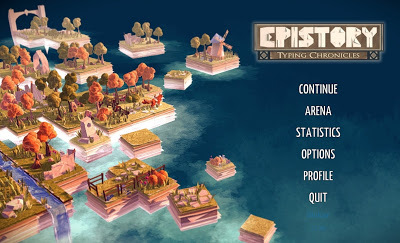
I mean sure, it has an origami girl on a cool origami fox trotting through an origami landscape that unfolds before your eyes. And you can change the landscape - spawning trees or flowers or removing logs by typing their names. And the creepy crawlies coming toward you every so often are easily banished with a quick key word or several key words. And you even get skills to take out multiple enemies at once, and can manage boss battles where a dozen things are heading toward you from all sides and you're typing and owning them with your skills and your three and four and five letter words and then it hits you with nocturnal and polysyllabic and hyperglaecemic and...
Beginner typists simply aren't going to survive.
It was fairly short on the story part, and the control mechanism for the fox is a bit irritating, but for those who are fast typists, this game will give you a nice challenge.
Epistory is definitely not here to teach you typing. In fact, if you're not a plus 50 wpm (and preferably more like plus 80 wpm) typist, I don't recommend this game.

I mean sure, it has an origami girl on a cool origami fox trotting through an origami landscape that unfolds before your eyes. And you can change the landscape - spawning trees or flowers or removing logs by typing their names. And the creepy crawlies coming toward you every so often are easily banished with a quick key word or several key words. And you even get skills to take out multiple enemies at once, and can manage boss battles where a dozen things are heading toward you from all sides and you're typing and owning them with your skills and your three and four and five letter words and then it hits you with nocturnal and polysyllabic and hyperglaecemic and...
Beginner typists simply aren't going to survive.
It was fairly short on the story part, and the control mechanism for the fox is a bit irritating, but for those who are fast typists, this game will give you a nice challenge.
Published on September 29, 2016 03:30
September 24, 2016
Slownesses
Much hard work lately, but no releases to show for it! I'm about three-four chapters from the end of my current project, though, and have nearly figured out how I want to rewrite the beginning of the main story of The Towers, the Moon after feedback. This means two releases by the end of the year, although I'm not going to set any fixed dates.
I've really been enjoying writing MMO-related stories, though it makes me SO tempted to pick up an MMO and lose myself for a few months.
It's spring here in Sydney, which means lots of flowers, but also more weeding and mowing. The brand new leaves on deciduous trees are very lovely as well.






I've really been enjoying writing MMO-related stories, though it makes me SO tempted to pick up an MMO and lose myself for a few months.
It's spring here in Sydney, which means lots of flowers, but also more weeding and mowing. The brand new leaves on deciduous trees are very lovely as well.






Published on September 24, 2016 03:06
July 23, 2016
Stranger Things (mild spoilers)
This is a Netflix science fiction series set in the 80s, where the disappearance of a young boy and the arrival of a girl with mysterious powers are linked to strange happenings at a shadowy research facility. Think Firestarter combined with Super 8.
Like Super 8, there's a small group of boys involved, and a solid chunk of the story is about their friendship. There's also an older sister who has a boys-related plot, which morphed into something better. And a Sheriff who never really recovered from losing his daughter.
There's not a lot of...original in this story, but it's fairly gripping in parts (I'm a shameless skipper-ahead when there's boring scenes). And there was stuff that, inevitably, annoyed me.
The boyfriend related stuff I simply found tiresome, even though they were clearly attempting to deconstruct some of the usual beats of that tale. But what I disliked about the sister's plotline was where the sister's less-attractive best friend ended up. Painfully predictable outcome.
I appreciated some of the brave and logical things 'frantic Mum' did.
One of the things that bugged me most, though, is that these D&D-playing, SFF-loving kids, have zero imagination about 'Eleven', the mysterious girl. They are genre-savvy and she's clearly an escapee, clearly traumatised, has powers...and they are constantly attacking her for being 'creepy', for not explaining things clearly. The same goes for the two older teens - at times they seem to be acting not out of bravery, but a complete failure to have any awareness of horror narratives, even after seeing more visual proof of creepiness than anyone else. Who crawls through mucus-filled holes in trees and doesn't expect to find anything horrible on the far side?
It kept my interest to the ending, but then I was again rolling my eyes at the "reset to normality but not" final beat. So a partial recommendation: some good suspense, a couple of occasions where girls got to step outside expectations, but we're definitely going back to the 80s with this - not anywhere new.
Like Super 8, there's a small group of boys involved, and a solid chunk of the story is about their friendship. There's also an older sister who has a boys-related plot, which morphed into something better. And a Sheriff who never really recovered from losing his daughter.
There's not a lot of...original in this story, but it's fairly gripping in parts (I'm a shameless skipper-ahead when there's boring scenes). And there was stuff that, inevitably, annoyed me.
The boyfriend related stuff I simply found tiresome, even though they were clearly attempting to deconstruct some of the usual beats of that tale. But what I disliked about the sister's plotline was where the sister's less-attractive best friend ended up. Painfully predictable outcome.
I appreciated some of the brave and logical things 'frantic Mum' did.
One of the things that bugged me most, though, is that these D&D-playing, SFF-loving kids, have zero imagination about 'Eleven', the mysterious girl. They are genre-savvy and she's clearly an escapee, clearly traumatised, has powers...and they are constantly attacking her for being 'creepy', for not explaining things clearly. The same goes for the two older teens - at times they seem to be acting not out of bravery, but a complete failure to have any awareness of horror narratives, even after seeing more visual proof of creepiness than anyone else. Who crawls through mucus-filled holes in trees and doesn't expect to find anything horrible on the far side?
It kept my interest to the ending, but then I was again rolling my eyes at the "reset to normality but not" final beat. So a partial recommendation: some good suspense, a couple of occasions where girls got to step outside expectations, but we're definitely going back to the 80s with this - not anywhere new.
Published on July 23, 2016 19:19
July 9, 2016
Inside (game) (no spoilers)
A friend of mine emailed me about this game, noting that she'd seen reviews that said "buy and play and don’t look at reviews first so you get the full wonder of it" - and so I did.
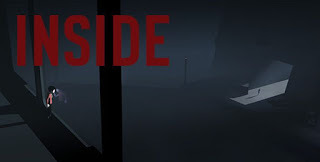
The game starts with a boy, in a forest, who starts to run right...and that's about all I'm planning to tell you about the details of the game. It really is a game that will reward discovering what happens by yourself.
"Creepy mindfuck" is the most common description I've been able to find for that game...and that fits well enough. It certainly is an incredibly tense and atmospheric game, with good, mostly not-too-difficult puzzles and multiple moments of wonder, awe and horror.
I'm so-so on the ultimate ending, but this game was definitely more about the journey than the explanation.
You'll get about four hours worth of playtime out of it - and for those without the budget/inclination, this is a game which will probably be enjoyable to watch a few Let's Plays (especially a couple of the more shocking bits).
Potential spoilers in any comments, so if you haven't played don't read them just in case...

The game starts with a boy, in a forest, who starts to run right...and that's about all I'm planning to tell you about the details of the game. It really is a game that will reward discovering what happens by yourself.
"Creepy mindfuck" is the most common description I've been able to find for that game...and that fits well enough. It certainly is an incredibly tense and atmospheric game, with good, mostly not-too-difficult puzzles and multiple moments of wonder, awe and horror.
I'm so-so on the ultimate ending, but this game was definitely more about the journey than the explanation.
You'll get about four hours worth of playtime out of it - and for those without the budget/inclination, this is a game which will probably be enjoyable to watch a few Let's Plays (especially a couple of the more shocking bits).
Potential spoilers in any comments, so if you haven't played don't read them just in case...
Published on July 09, 2016 00:50
June 18, 2016
June status and writing side-effects
I was just checking my Goodreads records, and it says I've read 26 books so far this year (as we near the halfway point) and twenty of them were read before March (so six books between March and June). By contrast, in 2011 I read 159 books in the year.
This is one of the big costs of writing for me - when I'm doing first drafts, I tend to stop reading. It's too distracting. I also tend to avoid whatever genre I'm writing, so I've read barely any fantasy (reserving what I do read to re-reads, graphic novels, or fave authors). Mystery is a useful genre for me since I don't write it, and usually am more able to put it down and go back to what I'm working on.
Anyway, the lack of books read does indicate a lot of writing, and in a couple of weeks I'll be able to send all three stories for the 'side trip to France' off to be edited, and will start working fully on Snug Ship. If I'm diligent, I should have three whole releases this year, which will be interesting!
Writing 'interstitial' stories is a new experiment for me. I have a plot-line for the Trifold stories that will be covered in five books. Stories in between the stories need to be worthwhile in themselves, and yet not substantially impact the main story, allowing the shorts to be optional. Two Wings, Forfeit and Death and the Moon are all a combination of showing the reader France, and character stories where Griff, Rian and Eluned are all focused on 'who am I just now'.
But I enjoyed it! I think I will do some more in between stories in Trifold - but not until Tangleways is done.
[Note that there is no story from Eleri's POV - she's a harder voice for me to capture. Griff is very funny, though.]
This is one of the big costs of writing for me - when I'm doing first drafts, I tend to stop reading. It's too distracting. I also tend to avoid whatever genre I'm writing, so I've read barely any fantasy (reserving what I do read to re-reads, graphic novels, or fave authors). Mystery is a useful genre for me since I don't write it, and usually am more able to put it down and go back to what I'm working on.
Anyway, the lack of books read does indicate a lot of writing, and in a couple of weeks I'll be able to send all three stories for the 'side trip to France' off to be edited, and will start working fully on Snug Ship. If I'm diligent, I should have three whole releases this year, which will be interesting!
Writing 'interstitial' stories is a new experiment for me. I have a plot-line for the Trifold stories that will be covered in five books. Stories in between the stories need to be worthwhile in themselves, and yet not substantially impact the main story, allowing the shorts to be optional. Two Wings, Forfeit and Death and the Moon are all a combination of showing the reader France, and character stories where Griff, Rian and Eluned are all focused on 'who am I just now'.
But I enjoyed it! I think I will do some more in between stories in Trifold - but not until Tangleways is done.
[Note that there is no story from Eleri's POV - she's a harder voice for me to capture. Griff is very funny, though.]
Published on June 18, 2016 03:22
May 30, 2016
Interview with Intisar Khanani (Memories of Ash Release and Giveaway)
 I admit, I first read Intisar Khanani's
Sunbolt
because her name reminded me of Inisar (the Nuran Setari). I'm shallow that way. :)
I admit, I first read Intisar Khanani's
Sunbolt
because her name reminded me of Inisar (the Nuran Setari). I'm shallow that way. :)I enjoyed Sunbolt thoroughly - it's a fast-paced novella about Hitomi, a street girl with a secret and a lot of trouble heading her way, and when I saw Intisar was releasing a sequel, Memories of Ash , I grabbed the opportunity to ask her a few questions about the world of Sunbolt, and her plans for the story's future.
So for fans of Intisar, and those hearing of her for the first time, here's a little background to a grand new world (and scroll all the way to the end of the post to enter a giveaway that includes a couple of my books!).
--------------
Q: In Sunbolt you use elements that readers currently associate with paranormal/urban fantasy (vampires, weres) in a secondary world – but, of course, they have a long tradition in high fantasy as well. Do you think there's more scope these days to do interesting things with well-known creatures in secondary worlds?
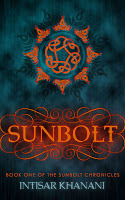 A: Absolutely. I think the advent of indie publishing has meant a freedom for authors try new things in a way that traditional publishing wouldn't have approved of--if for no other reason than that it would make it difficult to decide which shelf to put the book on. I think there's scope both for trying new things with well-known creatures in secondary worlds, and for bringing in cultures and their mythos and legends that have been traditionally ignored.
A: Absolutely. I think the advent of indie publishing has meant a freedom for authors try new things in a way that traditional publishing wouldn't have approved of--if for no other reason than that it would make it difficult to decide which shelf to put the book on. I think there's scope both for trying new things with well-known creatures in secondary worlds, and for bringing in cultures and their mythos and legends that have been traditionally ignored.For example, in Sunbolt, both Hitomi and Kenta are from a culture that is built around historic Japanese culture. Further, Kenta is a tanuki--a raccoon dog known as both a trickster and a drunk in Japanese folk lore. As Hitomi continues to travel through the Eleven Kingdoms, she will meet with other cultures reminiscent of real-world historical cultures, as well as their attendant fantastical creatures.
The danger with this kind of approach, of course, is cherry-picking cultures for exotic elements. We see that happening in more than a few mainstream fantasy novels that claim the "diversity" label. It's unfortunate, because a culture is more than just a pair of chopsticks, or some unusual architecture, or a few key dishes--or that really cool fantasy creature. For example, jinn seem to be quite the thing nowadays, especially among authors who haven't researched them past the obvious. I find it incredibly frustrating as someone who grew up with stories of jinn and have lived in cultures that maintain a strong tradition of believing in--and even interacting with--jinn. So while there is definitely more scope for incorporating fantastical creatures in all different walks of fantasy, I do believe there's a responsibility on the part of the author to not only do their research, but to incorporate the diverse cultures they are drawing on as fully as possible in their works.
Q: Hitomi starts off her adventure as the classic streetwise orphan – but with established connections to the city's underworld. Do you prefer your protagonists to have a strong social network, or face new beginnings with new people?
It really depends on the story and the character. In my novel, Thorn, the heroine is not only leaving everything she knows for a new land, but her identity is forcibly stolen from her along the way. She ends up without connections or support beyond a single, magical creature who witnessed the switch. Being on her own, and responsible for choosing her own fate, are critical in Thorn's development over the course of the story. So I guess I've already written both ends of the spectrum! I do really enjoy pulling characters out of their comfort zones and throwing them at a completely new situation. Even in Sunbolt, Hitomi is quickly pulled out of her social network to face some unpleasant situations on her own.
Q: Hitomi obviously has quite an adventure still ahead of her. Do you have plans for other stories within Hitomi's world, or do you like to create a new world for new stories?
I really don't know... I love Hitomi's world, and have put a good deal of time and research into building it. I suspect I'll want to place other stories there, though I sincerely doubt there would be any overlap in timelines. But I haven't decided yet--I'm still just trying to get Hitomi's story down!
--------------
Thank you, Intisar, for the interview, and best of luck with the new release! See below for details of Intisar's books, and to enter in a giveaway for a selection of SFF books - and a Kindle Fire.
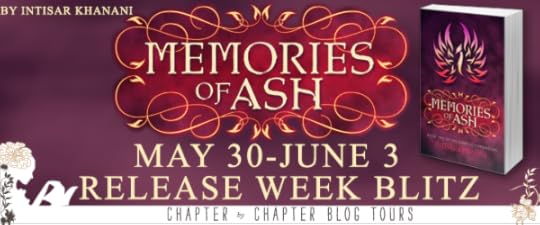
Hello readers! Welcome to the Release Week Blitz forMemories of Ash (The Sunbolt Chronicles #2) by Intisar KhananiFantasy lovers, this one's for you! Love magic, look no further!And you definitely need to check out the awesome giveaway found below.
Happy Book Birthday Intisar!Let's celebrate everyone!!
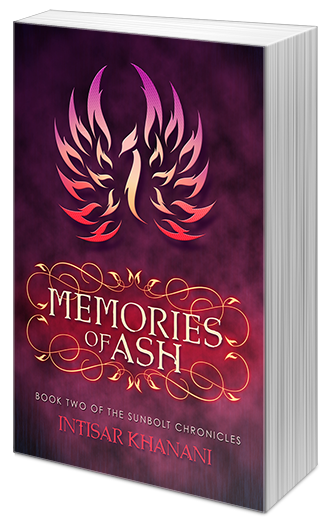
In the year since she cast her sunbolt, Hitomi has recovered only a handful of memories. But the truths of the past have a tendency to come calling, and an isolated mountain fastness can offer only so much shelter. When the High Council of Mages summons Brigit Stormwind to stand trial for treason, Hitomi knows her mentor won’t return—not with Arch Mage Blackflame behind the charges.Armed only with her magic and her wits, Hitomi vows to free her mentor from unjust imprisonment. She must traverse spell-cursed lands and barren deserts, facing powerful ancient enchantments and navigating bitter enmities, as she races to reach the High Council. There, she reunites with old friends, planning a rescue equal parts magic and trickery. If she succeeds, Hitomi will be hunted the rest of her life. If she fails, she’ll face the ultimate punishment: enslavement to the High Council, her magic slowly drained until she dies.
 Title: Memories of Ash Series: The Sunbolt Chronicles, Book Two Author: Intisar KhananiCover Designer: Jenny ZemanekGenre: Young Adult Fantasy Release Date: May 30, 2016 Publisher: Purple Monkey PressAmazon | Barnes & Noble | Apple | Kobo
Title: Memories of Ash Series: The Sunbolt Chronicles, Book Two Author: Intisar KhananiCover Designer: Jenny ZemanekGenre: Young Adult Fantasy Release Date: May 30, 2016 Publisher: Purple Monkey PressAmazon | Barnes & Noble | Apple | Kobo 
OTHER BOOKS IN THE SERIES:
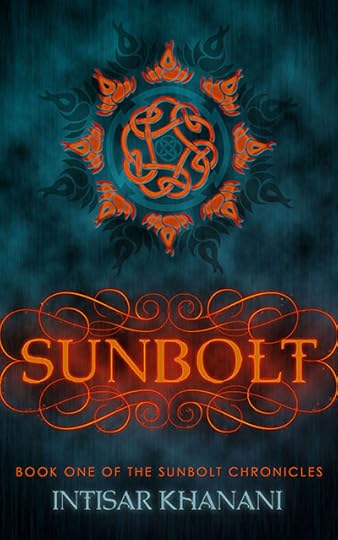
The winding streets and narrow alleys of Karolene hide many secrets, and Hitomi is one of them. Orphaned at a young age, Hitomi has learned to hide her magical aptitude and who her parents really were. Most of all, she must conceal her role in the Shadow League, an underground movement working to undermine the powerful and corrupt Arch Mage Wilhelm Blackflame.When the League gets word that Blackflame intends to detain—and execute—a leading political family, Hitomi volunteers to help the family escape. But there are more secrets at play than Hitomi’s, and much worse fates than execution. When Hitomi finds herself captured along with her charges, it will take everything she can summon to escape with her life.



Intisar Khanani grew up a nomad and world traveler. Born in Wisconsin, she has lived in five different states as well as in Jeddah on the coast of the Red Sea. She first remembers seeing snow on a wintry street in Zurich, Switzerland, and vaguely recollects having breakfast with the orangutans at the Singapore Zoo when she was five. She currently resides in Cincinnati, Ohio, with her husband and two young daughters.Until recently, Intisar wrote grants and developed projects to address community health with the Cincinnati Health Department, which was as close as she could get to saving the world. Now she focuses her time on her two passions: raising her family and writing fantasy. Intisar's current projects include a companion trilogy to Thorn, following the heroine introduced in her free short story The Bone Knife, and The Sunbolt Chronicles, an epic series following a street thief with a propensity to play hero when people need saving, and her nemesis, a dark mage intent on taking over the Eleven Kingdoms.Website | Goodreads | Facebook | Twitter
 Complete the Rafflecopter below for a chance to win!
Complete the Rafflecopter below for a chance to win! 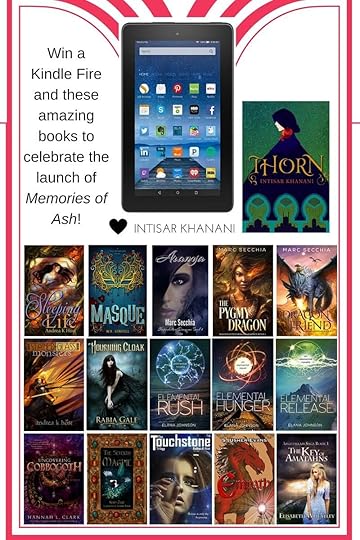 a Rafflecopter giveaway
a Rafflecopter giveaway

Published on May 30, 2016 03:46
May 15, 2016
Uncharted 4 (no spoilers)
Uncharted 4 is the conclusion to a long-running action/adventure series that's been around almost as long as Tomb Raider. I passed over the series when it was originally released because it had a greater focus on gun fights than I'm generally interested in, but when the first three games were released as a remastered collection I played through them (on "I don't care about combat" mode) and enjoyed the spectacular scenery, the strong characterisation, and the cool lost cities.
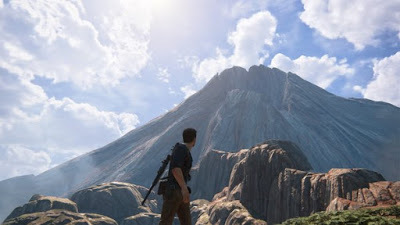
Story-wise, I'd say Uncharted is stronger than Tomb Raider (both old and new) because it sets up a small cast of 'good' guys and plays off the interaction between them over multiple games. Uncharted 4 thoroughly delivers on a strong adventure story (and, happily, gets away from the supernatural element that made the conclusions to the the first three games feel...kinda repetitive). There are two things pulling the story along - Nate's (previously unmentioned) brother, and the conflict between marriage/going straight and an in-born love of adventure.
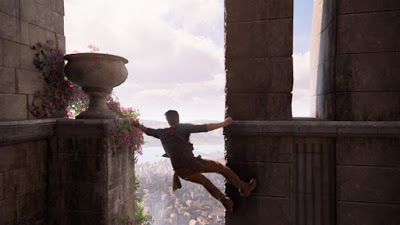
It was the second point that worried me going into this story, and early on it seemed that my concerns would be realised, with Elena functioning as almost an 'anchor' keeping Nate from the stuff he loves. Overall, though, I think the game managed to find a good resolution to the problem, and as a series I think it treats female characters reasonably well.
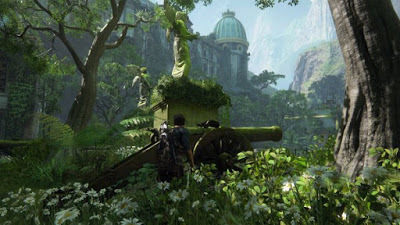
For gameplay (ignoring the gun fights, which still don't much interest me), this was a really well-balanced puzzler, mainly involving trying to figure out how to climb things, or survive buildings (inevitably) collapsing around Nate. One thing that really stands out as a huge step forward was the companion interaction. Nate has a companion with him at least half the time, and instead of passively waiting about, the companion will wander around, inspect things, kill the occasional thug, try out different climbing routes - sometimes even taking the lead - and make helpful suggestions if you spend too long faffing about.
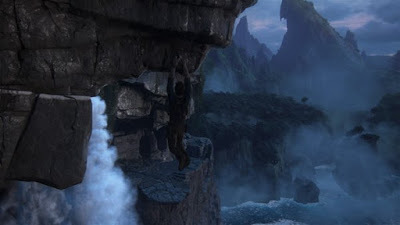
Most of all, there was scenery. Just, freaking awesome scenery. And wondrous and completely unlikely ruins, soon to be recklessly destroyed by Nate, his friends and opponents - none of whom seem to understand that an object doesn't need to be made of gold to be valuable.
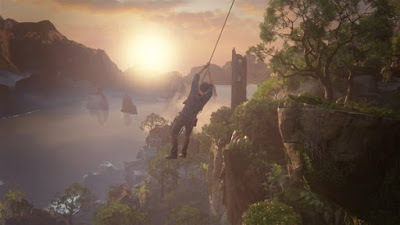
The one thing the game lacked was Chloe (a kick-ass lady from earlier games), but I guess you can't have everything.

Story-wise, I'd say Uncharted is stronger than Tomb Raider (both old and new) because it sets up a small cast of 'good' guys and plays off the interaction between them over multiple games. Uncharted 4 thoroughly delivers on a strong adventure story (and, happily, gets away from the supernatural element that made the conclusions to the the first three games feel...kinda repetitive). There are two things pulling the story along - Nate's (previously unmentioned) brother, and the conflict between marriage/going straight and an in-born love of adventure.

It was the second point that worried me going into this story, and early on it seemed that my concerns would be realised, with Elena functioning as almost an 'anchor' keeping Nate from the stuff he loves. Overall, though, I think the game managed to find a good resolution to the problem, and as a series I think it treats female characters reasonably well.

For gameplay (ignoring the gun fights, which still don't much interest me), this was a really well-balanced puzzler, mainly involving trying to figure out how to climb things, or survive buildings (inevitably) collapsing around Nate. One thing that really stands out as a huge step forward was the companion interaction. Nate has a companion with him at least half the time, and instead of passively waiting about, the companion will wander around, inspect things, kill the occasional thug, try out different climbing routes - sometimes even taking the lead - and make helpful suggestions if you spend too long faffing about.

Most of all, there was scenery. Just, freaking awesome scenery. And wondrous and completely unlikely ruins, soon to be recklessly destroyed by Nate, his friends and opponents - none of whom seem to understand that an object doesn't need to be made of gold to be valuable.

The one thing the game lacked was Chloe (a kick-ass lady from earlier games), but I guess you can't have everything.
Published on May 15, 2016 03:41
April 23, 2016
Goetia
Goetia is a point and click puzzle game where you play a glowing ball of light that rises up from the grave of a girl named Abigail, and spend your time trying to work out what happened to Abigail's family, and why Abigail's family home is abandoned.
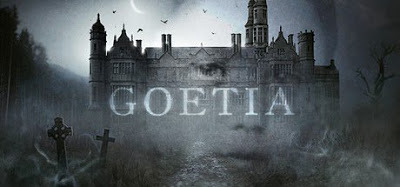
Being a glowing ball of light has its advantages - you can pass through walls, for a start, though you soon encounter walls with demonic shields. And a demon.
This is an eerie, interesting and enjoyable game that will give between five to infinity of gameplay, depending on how good you are at puzzles, or how quickly you give in and cheat. It's a hard game, with no handy arrows pointing to where you should go next, but mostly logical puzzles that you can solve with a bit of work. I was very proud of myself for solving the typewriter translation! I cheated ruthlessly in other parts!
Recommended to fans to spooky point and click.

Being a glowing ball of light has its advantages - you can pass through walls, for a start, though you soon encounter walls with demonic shields. And a demon.
This is an eerie, interesting and enjoyable game that will give between five to infinity of gameplay, depending on how good you are at puzzles, or how quickly you give in and cheat. It's a hard game, with no handy arrows pointing to where you should go next, but mostly logical puzzles that you can solve with a bit of work. I was very proud of myself for solving the typewriter translation! I cheated ruthlessly in other parts!
Recommended to fans to spooky point and click.
Published on April 23, 2016 05:28
March 17, 2016
Story status, and the Line between Appropriation and Erasure
I'm currently still working on The Towers of the Moon, the small collection of short stories in the Trifold world (showing what happens on the trip to France in between Pyramids and Tangleways).
I am so not a short story writer.
By which I mean I have so far written a novelette (Two Wings) and am halfway through a novella (Forfeit). Then there should be an actual short story (possibly called The Queen of Hades if I don't outright call it Ned's First Kiss).
I started thinking about stories set in France while in Paris in 2014, walking along the Seine getting a feel for the landscape and wondering what would France look like in a world where local gods 'Answered' their people, effectively protecting and preserving many cultures that have been erased in our world? Would it be steampunk Asterix and Obelix?
Okay, I never seriously considered steampunk Asterix and Obelix, but I would pay to see some concept art.
In the end, I chose for the gods of France to not Answer. France instead was invaded - briefly by Rome, and then the people of the "Green Aesir" (which is what I've been calling the Germanic gods who are very very similar to the Nordic gods) - and later by the Cour d'lune, which are "sort of low gravity Fae dragon people", and don't call themselves gods at all.
Basically, I erased both France's true past, and her early cultural history, and replaced it with an invention of my own.
Writing the Trifold series - any alt-myth series - requires many decisions regarding appropriation and erasure. I've been thinking this over lately after reading numerous thoughtful essays about JK Rowling's "History of Magic in Northern America", which appears to have involved conflation of multiple different traditions and beliefs. The essays ask (or state an opinion on) whether it is ever okay to 'mine' other cultures for their beliefs in order to write fantasy.
Now I'm Swedish on my father's side, and Swedish/Danish/Scotch/French/English on my mother's side. But mainly Australian. I would not feel at all comfortable embarking on a series that used Australian Aboriginal cultures and beliefs as a basis - the closest I've come to that was a short story, Blue, that positioned the POV character as an outsider who is "welcomed to country" (a tradition that has grown up in Australia to acknowledge that we occupy a land stolen from its peoples).
But while I am not very French, my great-grandfather was. Does that make France 'open season' for me? I was born in Sweden: is Loki mine? If a people runs around invading other countries and attempting to imprint its culture onto the locals (as Rome did), does that make their culture mine? I'm using the Latin-based alphabet to write this blog, after all. Half my language is based on Rome's.
And what of Hades? Can I mine Greek myths, since Rome's gods apparently were rather strongly copied from Greek gods, just with judicious tweaks and renaming? If I've had Rome's gods Answer, does that mean they're really the Hellenic gods? And who gets to play in the traditions of Egypt, whose cultural disconnect was so complete that the language was lost - and yet Egypt is surely populated with the descendents of the people of Kemet.
At one point when thinking this through during the drafting of Pyramids I started wondering whether an alt-world/alt-myth series was really a good idea. Or, at the least, whether I should confine the story very strictly to Sweden and England. But that's a different form of erasure. How could I start with our world, with its thousands of cultures, and only ever mention two? That seemed rather the worse route to take.
The end result is a story that is primarily focused around cultures that I have some connection to, choosing to include cultures that have been part of the 'primary interchange' in Europe (eg. the Hellenes) while acknowledging that there is so much more world out there, and providing an outline of its shape.
This involves a heap of extra research.
The Trifold version of North America, for example, is called Stomruria (at least by the Norse, and the people who were first told about the place by the Norse). For a book that does not mention that continent at all, I spent a lot of time researching First Nation tribal boundaries and beliefs, all because I wanted to acknowledge the place existed, and give a tiny glimpse of that vast continent by the inclusion of a Wabanaki fencing master (Wabanaki being a country in north-eastern Stomruria).
I don't intend for my characters to visit Stomruria at all in the series, but to write in this world at a point where all the continents are known and interacting with each other, I had to have some idea whether Stomrurian gods had Answered, which of them had Answered, what impact that had had on tribal boundaries, what those boundaries would be after a millenia or so, and what they would call themselves.
There isn't a way to get an alt world 'right'. Not being completely, immensely, insultingly wrong involves much side-reading. But I now know (or have at least read - my memory sucks) the names of many African kingdoms that I never knew existed. I know which side of a continent 'Thunderbird' belongs to. I now know about the Lady of Yue and her influence on the art of the sword.
Trying not to be insultingly wrong is a reward in itself.
I am so not a short story writer.
By which I mean I have so far written a novelette (Two Wings) and am halfway through a novella (Forfeit). Then there should be an actual short story (possibly called The Queen of Hades if I don't outright call it Ned's First Kiss).
I started thinking about stories set in France while in Paris in 2014, walking along the Seine getting a feel for the landscape and wondering what would France look like in a world where local gods 'Answered' their people, effectively protecting and preserving many cultures that have been erased in our world? Would it be steampunk Asterix and Obelix?
Okay, I never seriously considered steampunk Asterix and Obelix, but I would pay to see some concept art.
In the end, I chose for the gods of France to not Answer. France instead was invaded - briefly by Rome, and then the people of the "Green Aesir" (which is what I've been calling the Germanic gods who are very very similar to the Nordic gods) - and later by the Cour d'lune, which are "sort of low gravity Fae dragon people", and don't call themselves gods at all.
Basically, I erased both France's true past, and her early cultural history, and replaced it with an invention of my own.
Writing the Trifold series - any alt-myth series - requires many decisions regarding appropriation and erasure. I've been thinking this over lately after reading numerous thoughtful essays about JK Rowling's "History of Magic in Northern America", which appears to have involved conflation of multiple different traditions and beliefs. The essays ask (or state an opinion on) whether it is ever okay to 'mine' other cultures for their beliefs in order to write fantasy.
Now I'm Swedish on my father's side, and Swedish/Danish/Scotch/French/English on my mother's side. But mainly Australian. I would not feel at all comfortable embarking on a series that used Australian Aboriginal cultures and beliefs as a basis - the closest I've come to that was a short story, Blue, that positioned the POV character as an outsider who is "welcomed to country" (a tradition that has grown up in Australia to acknowledge that we occupy a land stolen from its peoples).
But while I am not very French, my great-grandfather was. Does that make France 'open season' for me? I was born in Sweden: is Loki mine? If a people runs around invading other countries and attempting to imprint its culture onto the locals (as Rome did), does that make their culture mine? I'm using the Latin-based alphabet to write this blog, after all. Half my language is based on Rome's.
And what of Hades? Can I mine Greek myths, since Rome's gods apparently were rather strongly copied from Greek gods, just with judicious tweaks and renaming? If I've had Rome's gods Answer, does that mean they're really the Hellenic gods? And who gets to play in the traditions of Egypt, whose cultural disconnect was so complete that the language was lost - and yet Egypt is surely populated with the descendents of the people of Kemet.
At one point when thinking this through during the drafting of Pyramids I started wondering whether an alt-world/alt-myth series was really a good idea. Or, at the least, whether I should confine the story very strictly to Sweden and England. But that's a different form of erasure. How could I start with our world, with its thousands of cultures, and only ever mention two? That seemed rather the worse route to take.
The end result is a story that is primarily focused around cultures that I have some connection to, choosing to include cultures that have been part of the 'primary interchange' in Europe (eg. the Hellenes) while acknowledging that there is so much more world out there, and providing an outline of its shape.
This involves a heap of extra research.
The Trifold version of North America, for example, is called Stomruria (at least by the Norse, and the people who were first told about the place by the Norse). For a book that does not mention that continent at all, I spent a lot of time researching First Nation tribal boundaries and beliefs, all because I wanted to acknowledge the place existed, and give a tiny glimpse of that vast continent by the inclusion of a Wabanaki fencing master (Wabanaki being a country in north-eastern Stomruria).
I don't intend for my characters to visit Stomruria at all in the series, but to write in this world at a point where all the continents are known and interacting with each other, I had to have some idea whether Stomrurian gods had Answered, which of them had Answered, what impact that had had on tribal boundaries, what those boundaries would be after a millenia or so, and what they would call themselves.
There isn't a way to get an alt world 'right'. Not being completely, immensely, insultingly wrong involves much side-reading. But I now know (or have at least read - my memory sucks) the names of many African kingdoms that I never knew existed. I know which side of a continent 'Thunderbird' belongs to. I now know about the Lady of Yue and her influence on the art of the sword.
Trying not to be insultingly wrong is a reward in itself.
Published on March 17, 2016 17:23



